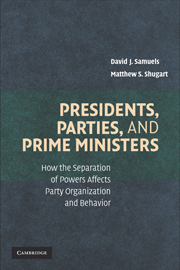 Presidents, Parties, and Prime Ministers
Presidents, Parties, and Prime Ministers Book contents
- Frontmatter
- Contents
- Preface and Acknowledgments
- Presidents, Parties, and Prime Ministers
- 1 Introduction
- 2 Political Parties in the Neo-Madisonian Theoretical Framework
- 3 Insiders and Outsiders
- 4 Constitutional Design and Intraparty Leadership Accountability
- 5 Electoral Separation of Purpose within Political Parties
- 6 The Impact of Constitutional Change on Party Organization and Behavior
- 7 Parties' “Presidential Dilemmas” in Brazil and Mexico
- 8 Presidents, Prime Ministers, and Mandate Representation
- 9 Conclusion
- References
- Index
Preface and Acknowledgments
Published online by Cambridge University Press: 05 June 2012
- Frontmatter
- Contents
- Preface and Acknowledgments
- Presidents, Parties, and Prime Ministers
- 1 Introduction
- 2 Political Parties in the Neo-Madisonian Theoretical Framework
- 3 Insiders and Outsiders
- 4 Constitutional Design and Intraparty Leadership Accountability
- 5 Electoral Separation of Purpose within Political Parties
- 6 The Impact of Constitutional Change on Party Organization and Behavior
- 7 Parties' “Presidential Dilemmas” in Brazil and Mexico
- 8 Presidents, Prime Ministers, and Mandate Representation
- 9 Conclusion
- References
- Index
Summary
This book brings together strands each of us has been thinking about for many years. Shugart's interest in the “distinctiveness” of presidential democracy and its impact on legislative elections and political parties began as he was working on his dissertation at the University of California, Irvine. In the dissertation, inspired largely by the work of Leon Epstein as well as by his own observations of politics in the United States and several Latin American countries, Shugart (1988) noted that presidentialism had an impact on both the number of parties and their “nature.” Yet developing just what that nature might be would lie dormant while he focused for a time on the number of parties and worked on other aspects of comparative presidentialism. Later, after taking up a faculty position at the University of California, San Diego, Shugart would begin exploring the “intraparty dimension” of parties – the idea that electoral institutions would shape the behavior and organization of parties as much as, and maybe even more profoundly than, they shape their number. However, he would not put together these two strands – that both presidentialism and legislative electoral institutions shape political parties – until some years later, in collaboration with Samuels.
In 1993, in his first semester of graduate school at the University of California, San Diego, Samuels scribbled a comment in the margins of Kaare Strøm's 1990 article, “A Behavioral Theory of Competitive Political Parties” (American Journal of Political Science 34: 565–98).
- Type
- Chapter
- Information
- Presidents, Parties, and Prime MinistersHow the Separation of Powers Affects Party Organization and Behavior, pp. ix - xiiPublisher: Cambridge University PressPrint publication year: 2010


